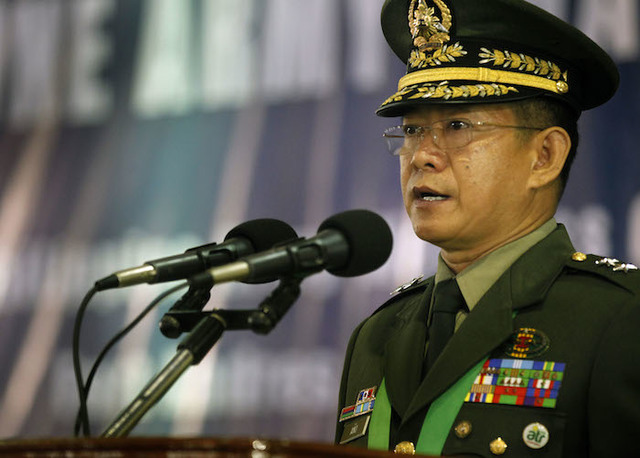AFP chief General Eduardo Año cites an order to the military to downplay 'news or information' on ISIS 'so as not to give them recognition and fan the flames of rebellion'

PSYCHOLOGICAL WARFARE. AFP Chief General Eduardo Año is a veteran intelligence officer who scored big arrests of communist leaders. Photo from Malacañang
As part of its psychological operations in its war on terror, the Armed Forces of the Philippines (AFP) was ordered to downplay the presence of global terror group ISIS in the Philippines, according to its chief.
AFP Chief General Eduardo Año admitted this is his affidavit quoted by Solicitor General Jose Calida in a memorandum submitted to the Supreme Court (SC) on Monday, June 19.
"That despite the actual threat of ISIS in the Philippines, there had been a directive to all AFP spokesperson and personnel to downplay any news or information pertaining to this collective group. This is so as not to give them recognition and fan the flames of rebellion," Año said in his affidavit quoted by Calida.
The AFP chief was referring to the repeated statements of AFP Public Affairs Office Chief Marine Colonel Edgard Arevalo on May 24 that the military was in "full control of the situation" of the siege in Marawi City.
In the same statement, Arevalo also said "the armed men we are dealing with are not ISIS but members of a local terrorist group."
After May 24, the military would admit the ISIS links of the Maute terror group which would become the main defense of the government for the sufficient factual basis of President Rodrigo Duterte's declaration of martial law in Mindanao.
Año also said in his affidavit that the statements downplaying ISIS' presence in the country "were made to encourage foreign investments and maintain confidence in the Philippine economy."
According to Calida, this is part of the military's psychological operations in its war against terrorists "to mislead, intimidate, demoralize, or otherwise influence the thinking or behavior of an opponent."
"What Petitioners failed to consider is that while the conflict is real, these statements were made as part of the AFP’s psychological operations," Calida said.
"What Petitioners failed to consider is that while the conflict is real, these statements were made as part of the AFP’s psychological operations," Calida said.
Therefore, Calida said, Arevalo's statements quoted by news reports and used by petitioners against the government are not valid because they were just part of the so-called psywar.
"The unreliability of these news reports to establish facts in a judicial proceeding becomes even more evident in the face of psychological warfare,” Calida said.
During the oral arguments on petitions against martial law in Mindanao, Solicitor General had revealed that the military had prior knowledge of a plot to establish an ISIS caliphate in Mindanao, and even the plot to attack Marawi City.
Calida also claimed there were 20 ISIS cell groups operating in Mindanao, though Defense Secretary Delfin Lorenzana told Rappler these groups have been reduced to an insignificant number and not a cause for panic.
Rommel Banlaoi, chairman of the Philippine Institute for Peace, Violence and Terrorism Research, had also said that Calida's list of ISIS cell groups may be inaccurate because it includes double entries and the Balik-Islam Group, which is dominated by Muslim converts who "very peaceful, very democratic, and very tolerant."

No comments:
Post a Comment
Note: Only a member of this blog may post a comment.